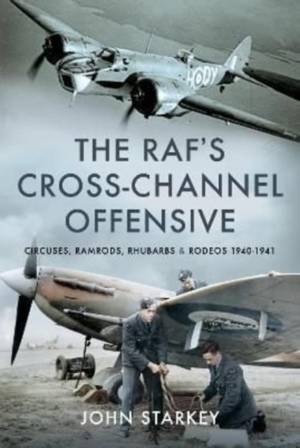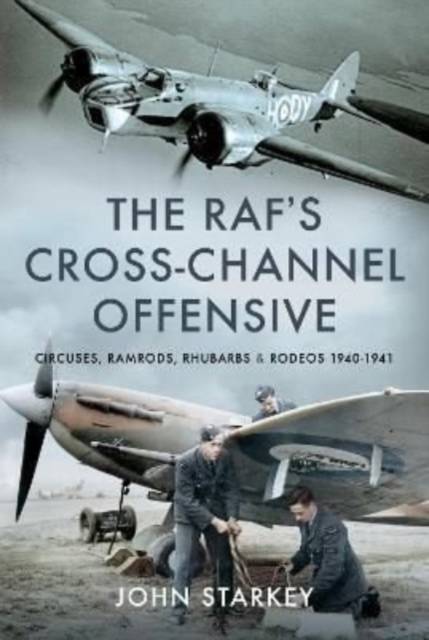
Je cadeautjes zeker op tijd in huis hebben voor de feestdagen? Kom langs in onze winkels en vind het perfecte geschenk!
- Afhalen na 1 uur in een winkel met voorraad
- Gratis thuislevering in België vanaf € 30
- Ruim aanbod met 7 miljoen producten
Je cadeautjes zeker op tijd in huis hebben voor de feestdagen? Kom langs in onze winkels en vind het perfecte geschenk!
- Afhalen na 1 uur in een winkel met voorraad
- Gratis thuislevering in België vanaf € 30
- Ruim aanbod met 7 miljoen producten
Zoeken
The Raf's Cross-Channel Offensive
Circuses, Ramrods, Rhubarbs and Rodeos 1941-1942
John Starkey
Hardcover | Engels
€ 34,95
+ 69 punten
Omschrijving
The story of the RAF, and in particular Fighter Command, during the Battle of Britain has been told many times. It is a tale of the gallant pilots of 'The Few', in their Hurricanes and Spitfires, with the nation's back to the wall, fighting off the Luftwaffe's airborne assault against enormous odds. But the story of Fighter Command's operations immediately after the Battle of Britain is less well known.
Marshal of the Royal Air Force Hugh Montague Trenchard commanded the Royal Flying Corps in the First World War. His policy then had been for his aircraft and men to be continually on the offensive, always over the German lines taking the fight to the enemy. After being promoted to command the RAF, Trenchard retired in 1930.
In November 1940, Trenchard showed up again at the Air Ministry and proposed that the RAF should 'Lean Towards France' - that it should go on the offensive. The RAF would, claimed Trenchard, win the resulting battle of attrition.
One of the main outcomes of the RAF's new offensive stance was the introduction of the Circus sorties. These were attacks undertaken by a small force of bombers with a powerful fighter escort. They were intended to lure enemy fighters into the air so that they could be engaged by RAF fighters, the primary objective being the destruction of Luftwaffe fighters, followed by the protection of the bombers from attack.
A further development of the Circus missions were Ramrods, Rhubarbs and Rodeos, all of which were variations on the same theme. A Ramrod was similar to a Circus, though in this instance the primary objective was the destruction of the target, the main role of the accompanying fighters being to protect the bombers from attack. A Rhubarb was a small-scale attack by fighters using cloud cover and/or surprise, the object of which was to destroy German aircraft in the air and/or striking at ground targets, while a Rodeo consisted of a fighter sweep over enemy territory with no bombers.
Drawing on official documents and archive material, as well as accounts by many of those involved, James Starkey reveals just how Trenchard's views won through and the RAF went on the offensive from late 1940 into 1941. Was it a failed strategy? If so, why was it not halted once the results began to be seen?
Marshal of the Royal Air Force Hugh Montague Trenchard commanded the Royal Flying Corps in the First World War. His policy then had been for his aircraft and men to be continually on the offensive, always over the German lines taking the fight to the enemy. After being promoted to command the RAF, Trenchard retired in 1930.
In November 1940, Trenchard showed up again at the Air Ministry and proposed that the RAF should 'Lean Towards France' - that it should go on the offensive. The RAF would, claimed Trenchard, win the resulting battle of attrition.
One of the main outcomes of the RAF's new offensive stance was the introduction of the Circus sorties. These were attacks undertaken by a small force of bombers with a powerful fighter escort. They were intended to lure enemy fighters into the air so that they could be engaged by RAF fighters, the primary objective being the destruction of Luftwaffe fighters, followed by the protection of the bombers from attack.
A further development of the Circus missions were Ramrods, Rhubarbs and Rodeos, all of which were variations on the same theme. A Ramrod was similar to a Circus, though in this instance the primary objective was the destruction of the target, the main role of the accompanying fighters being to protect the bombers from attack. A Rhubarb was a small-scale attack by fighters using cloud cover and/or surprise, the object of which was to destroy German aircraft in the air and/or striking at ground targets, while a Rodeo consisted of a fighter sweep over enemy territory with no bombers.
Drawing on official documents and archive material, as well as accounts by many of those involved, James Starkey reveals just how Trenchard's views won through and the RAF went on the offensive from late 1940 into 1941. Was it a failed strategy? If so, why was it not halted once the results began to be seen?
Specificaties
Betrokkenen
- Auteur(s):
- Uitgeverij:
Inhoud
- Aantal bladzijden:
- 280
- Taal:
- Engels
Eigenschappen
- Productcode (EAN):
- 9781399088923
- Verschijningsdatum:
- 5/01/2023
- Uitvoering:
- Hardcover
- Formaat:
- Genaaid
- Afmetingen:
- 163 mm x 226 mm
- Gewicht:
- 612 g

Alleen bij Standaard Boekhandel
+ 69 punten op je klantenkaart van Standaard Boekhandel
Beoordelingen
We publiceren alleen reviews die voldoen aan de voorwaarden voor reviews. Bekijk onze voorwaarden voor reviews.









